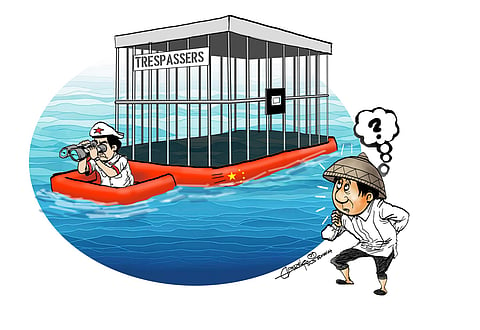
- NEWS
- the EDIT
- COMMENTARY
- BUSINESS
- LIFE
- SHOW
- ACTION
- GLOBAL GOALS
- SNAPS
- DYARYO TIRADA
- MORE

Is China’s warning that it would detain trespassers in its claimed maritime borders a legitimate exercise of its rights or simply a tactic to intimidate and deter other nations and fishermen from the disputed waters?
Whatever it is, the warning has not only raised the level of tension in the South China Sea but also unmasked its real intention over the waterway through which billions in trade passes annually.
First, let’s address the legality of China’s warning. The South China Sea is a contested region with overlapping claims by several countries, including the Philippines, Vietnam, Malaysia, Brunei and Taiwan.
China’s expansive claims, encapsulated in the so-called “nine-dash line,” have been a source of contention and have been largely rejected by the international community.
In 2016, the Permanent Court of Arbitration in The Hague ruled against China’s claims in a case brought by the Philippines. The tribunal concluded that China’s claim of historical rights had no legal basis under the United Nations Convention on the Law of the Sea (UNCLOS), to which China is a signatory.
Given this context, China’s assertion of its right to detain trespassers within what it considers its maritime borders is problematic. Legally, the waters within the nine-dash line are not recognized as Chinese territory by the international community, and detaining foreign nationals in these waters could be seen as an act of aggression or piracy.
Thus, from an international legal perspective, China’s warning lacks legitimacy and contravenes established maritime law.
Enforceability is the next critical issue. The South China Sea spans approximately 3.5-million square kilometers, a vast area that would require significant resources to monitor and patrol effectively. While China has invested heavily in its naval and coast guard capabilities, enforcing a detention policy over such a broad and heavily trafficked area would be a logistical nightmare.
Additionally, any attempt to detain foreign nationals would likely provoke strong reactions from the international community and could lead to dangerous confrontations. Countries like the United States, which conducts Freedom of Navigation Operations (FONOPs) in the region, are likely to respond assertively to any detentions, further complicating enforcement efforts.
Moreover, the practicality of detaining fishermen and other civilians from various countries presents another layer of complexity. These individuals often operate small, unarmed vessels and are engaged in activities such as fishing or transit through what are internationally recognized as neutral or disputed waters.
Detaining these individuals could lead to humanitarian issues, escalate regional tensions, and result in significant diplomatic fallout.
So, is this warning merely a tactic to intimidate and deter? The answer is likely yes. By issuing such warnings, China aims to exert psychological pressure on neighboring countries and their citizens, effectively discouraging them from entering disputed areas.
This tactic of intimidation and coercion is consistent with China’s broader strategy in the South China Sea, which includes building artificial islands, militarizing key outposts, and employing a maritime militia to assert its claims.
This approach leverages the ambiguity and complexity of the South China Sea dispute to create de facto control over the region. By instilling a fear of detention, China hopes to reduce the presence of foreign vessels and fishermen, thereby solidifying its dominance without having to resort to direct confrontation.
This strategy had seen some success in the past, as many smaller nations lack the naval capabilities to challenge China’s presence and thus may acquiesce to its demands to avoid conflict.
However, such tactics also have their limits. The international community, particularly regional powers and Western allies, is increasingly wary of China’s aggressive maneuvers.
ASEAN countries have begun to seek stronger ties with external powers like the United States, Japan and Australia to counterbalance China’s influence. Multilateral efforts to uphold international maritime law and maintain freedom of navigation are gaining momentum, with increased patrols and joint exercises in the region.
China’s warning, therefore, that it would detain trespassers lacks legitimacy under international law and is difficult to enforce effectively. It would only result in increasing tensions and drawing stronger opposition from the international community.
